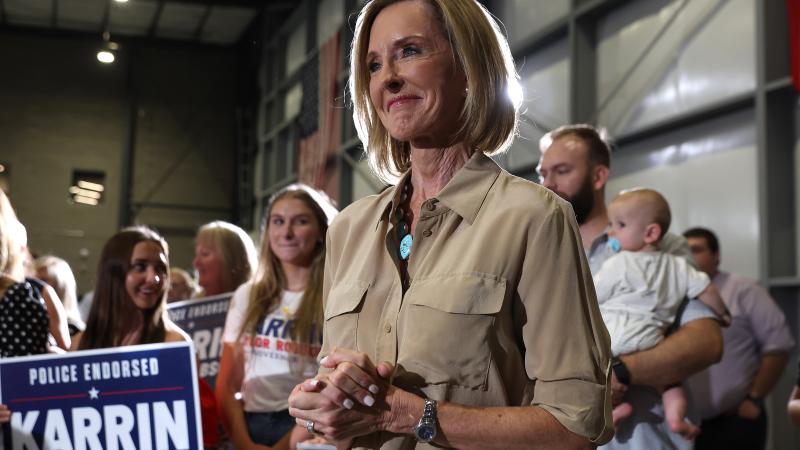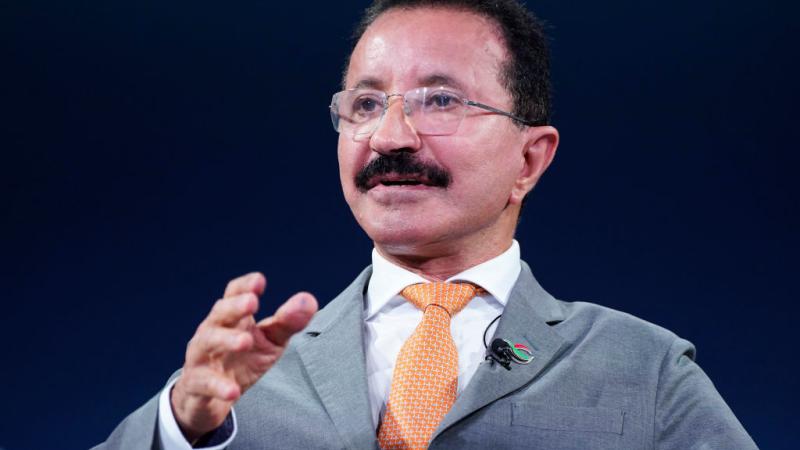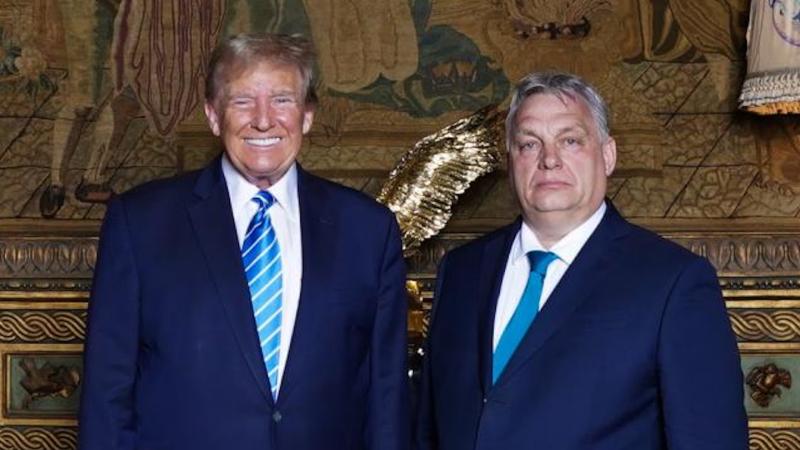Ballot signature matching system in Maricopa County is 'almost illegal,' says longtime FBI expert
Election workers "just staring at signatures," said Wayne Barnes, "don't know a good signature from a bad signature" or "what makes it valid."
As Kari Lake's lawsuit returns to the trial court for consideration of alleged violations of Maricopa County's signature verification rules in the Arizona 2022 general election, a retired FBI counterintelligence agent with longtime expertise in signature analysis says that matching ballot signatures with little time to review is "almost illegal."
If election workers have a limited amount of time to review signatures on early ballots to ensure they match with voters' files, it's "almost illegal to have it work that way," said retired FBI Special Agent Wayne A. Barnes, adding, "almost pathetic."
Barnes, a 29-year FBI veteran who mastered signature analysis while unmasking Soviet spies during the Cold War, previously wrote a report commissioned by Just the News that found that the signature on the receipt from the Delaware repair shop where Hunter Biden left his laptop was a match for the signature of President Biden's son.
The retired FBI agent's comments on signature verification followed a development in Lake's legal challenge to her defat in the 2022 gubernatorial race.
On Thursday, the Arizona Supreme Court ordered the trial court to conduct proceedings "forthwith" to resolve Lake's challenge to Maricopa County's alleged violations of its signature verification practices in the election, while granting one punitive sanction but denying attorneys' fees requested by the defendants.
Barnes, who has previously helped with ballot signature verification in Orlando, Fla., told Just the News on Friday that election workers aren't given "enough time" to check if signatures are matching. Signature verification requires "at least four to five signatures that are valid" and "not questionable" in order to compare signatures to determine if the signature in question is valid, he explained.
In Arizona, signature verification is required for early ballots so that voters' signatures on the ballot envelopes can be checked against signatures on voters' files to ensure they match. There is no ID requirement when casting an early ballot.
While election workers verifying signatures are usually given training, the retired FBI agent said that signature verification isn't something that a person can easily be trained to do the way he has been doing it for 45 years.
"If states don't" require voters to "show ID or picture ID" for comparison with those on file, then the "system is created to commit fraud," Barnes said.
Election workers "just staring at signatures," he said, "don't know a good signature from a bad signature" or "what makes it valid."
"The only thing the reviewer can do is the best he/she can" in comparing signatures on ballot envelopes to "those in the voter records," said the signature analyst.
Noting that signatures under analysis "always have to have the same styles" to permit accurate verification, Barnes explained that if someone is writing a signature on a ballot envelope, then they are "never writing it neat" and it won't "be matched because there are too many inconsistencies."
Ballot signature verification systems may thus be intrinsically flawed. "The way the [ballot signature verification] system works, it almost forces the reviewer to verify something that is not really verifiable," he said. A reviewer "essentially 'letting this one pass' is not vouching that this is a good [signature]."
In practice, the poll worker is essentially only checking a box that a "signature passed review," he said. "Only the most dissimilar signatures, when comparing them, can be knocked out."
However, "it is hardly good use of fraud with this aspect of mail-in ballots," he later added. "These one-at-a-time circumstances simply have too few ballots to be efficient for a true fraudster. More likely, the question is, 'Who put the ballot in the envelope, and under what circumstances?'"
Citing ballot harvesting as "an important unstated issue" with early voting, he suggested that fraud is likelier upstream from signature verification, saying "the fraud is committed closer to the source of the moment of filling out the form and not on the issue of whether the signatures match or don't."
Lake, the 2022 Arizona GOP gubernatorial nominee, fell about 17,000 votes short in her race against then-Secretary of State Katie Hobbs. She is suing Hobbs, now the incumbent Democratic governor, in addition to current Secretary of State Adrian Fontes and Maricopa County election officials. Her suit requests that the election results be invalidated or that she be declared the winner.
In March, the state Supreme Court remanded Lake's claim alleging massive signature verification failure to the trial court, ruling that because Lake is challenging a failure to adhere to current policy rather than the policy itself, her suit was not filed too late, as the lower court had found in dismissing her case.
Following the ruling, Lake tweeted: "For years signatures have been a third rail for Maricopa County. The process of verifying these signatures is the only security measure on mail-in ballots. The amount of time allotted to check these signatures was only 8 seconds, which is not humanly possible. The system is completely broken. That's why they are absolutely terrified of letting anyone take a look at their signatures. The signature verification process in Maricopa County is a house of cards. Thanks to this ruling my team will get the chance to topple it."
Three whistleblowers who "were intimately involved" in the signature verification process "allege that Maricopa County WILLFULLY ignored law and procedure," she added.
"This violation of procedure allowed for tens of thousands of illegal ballots to be approved and counted," she contined. "Aside from all other issues, including nearly 60% of polling locations being inoperable on Election Day, this issue alone casts the veracity of Katie Hobb's victory in serious doubt."
The eight-second estimate that Lake referred to was part of an analysis mentioned in a presentation to an Arizona state Senate committee by We the People AZ Alliance in January.
After the state high court's ruling in March, the Maricopa County Superior Court waited to return to Lake's case because the high court still needed to determine if Lake would be required to pay sanctions to Hobbs and Fontes regarding her claim that 35,563 unaccounted-for early ballots were added to Maricopa County's final tally.
The Arizona Supreme Court's ruling on Thursday ordered the lower court to start proceedings.
Lake "intends to petition [the trial court] to inspect the ballots verified by Maricopa, based on new evidence that came to light in 2023," according to a motion for a status conference her legal team submitted Thursday in Maricopa County Superior Court. "In addition, Lake has filed a special action in this Court to compel Maricopa to produce ballot envelopes and related public records for the 2022 election in response to Lake's Public Records Request."
After the state Supreme Court's ruling in March, Lake tweeted that Maricopa County was refusing to allow her "legal team to inspect ballot signatures."
On Friday, following the Arizona Supreme Court's ruling on Thursday, Lake tweeted: "I am so excited that our case is moving forward! I will not stop until we restore election integrity to the good people of Arizona."
On Thursday, Maricopa County Recorder Stephen Richer retweeted a tweet about the Arizona Supreme Court's sanction against Lake's legal counsel. "False statements coming from Kari Lake?" Richer wrote. "Say it ain't so! For those keeping score, Kari Lake has filed two election administration related lawsuits. She has now been sanctioned in both of them. This is an EXTRAORDINARY remedy that hardly ever happens. She's managed 2 for 2."
Following the Arizona Supreme Court's ruling in March, Richer gave a statement to Just the News. "We of course respect the Court's determination that one (out of many) of Lake's allegations should not have been dismissed according to one legal theory," he wrote. "We know, however, that if this allegation proceeds to a factual analysis, Maricopa County will be able to demonstrate that over 150 people spent a total of thousands of hours to review approximately 1.5 million signatures from the November 2022 election.
"Maricopa County's process is more robust than ever: workers received enhanced training; we have access to all signatures in the voter's file; and all initial determinations are sent to an audit queue. After this two-tiered review, Maricopa County found 18,510 signatures to be non-matching. Of those, we were able to 'cure' 15,411 by calling, mailing, texting, and emailing the voters.
"Those thousands of people can attest to the checks of our process, as can the over 150 bipartisan workers who reviewed signatures. Workers are always told that accuracy is the only important factor. Workers are not given a quota of how many signatures to complete in an hour. Workers are not paid according to the number of signatures they review. And at no point were workers told to 'hurry up.'"
Maricopa County told Just the News on Monday: "The Maricopa County Recorder's Office remains confident in its signature verification process.
"The system and signature review process consists of multiple levels. User Level 1 reviewers, who receive proper training, conduct an initial review. Recorder Richer ensured Level 1 reviewers had the appropriate time and resources to conduct their review by hiring 41 temporary staff (compared to 29 in 2020) and utilizing permanent staff.
"Level 2 Managers, who receive training from a certified forensic signature examiner, then review – including a batch audit of the Level 1 reviews.
"In addition to this multiple review level process that provides checks and balances to the process, the daily user audit (Level 3) also adds a layer of verification to the work product coming from the various reviewers – as every signature disposition set at any level is tied back to a specific user and their assigned username."














